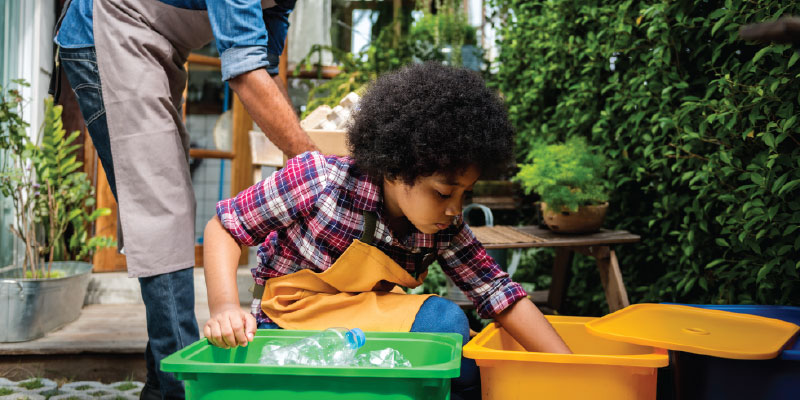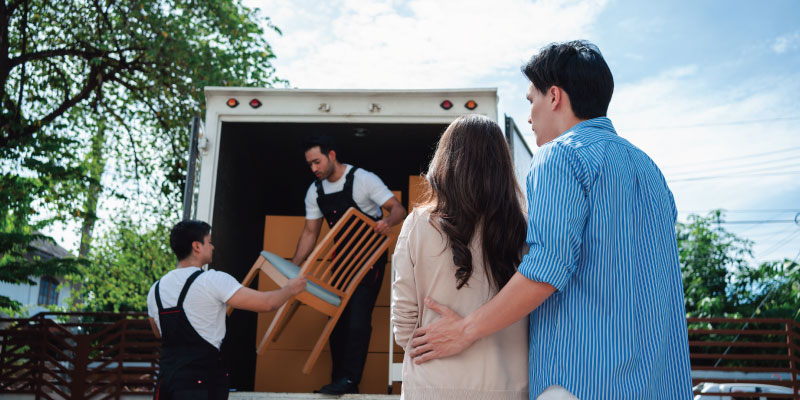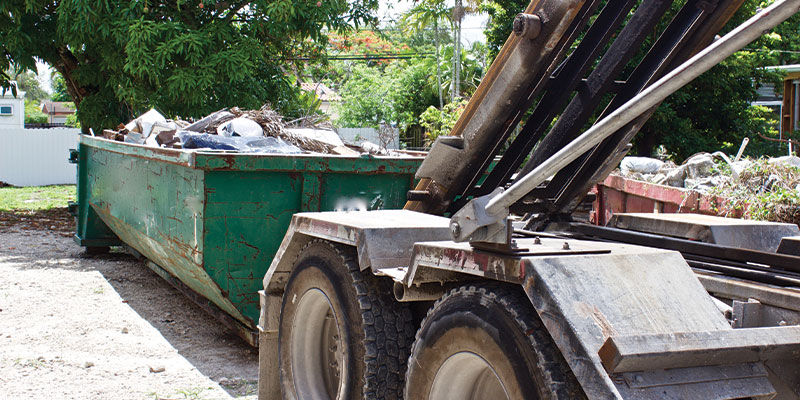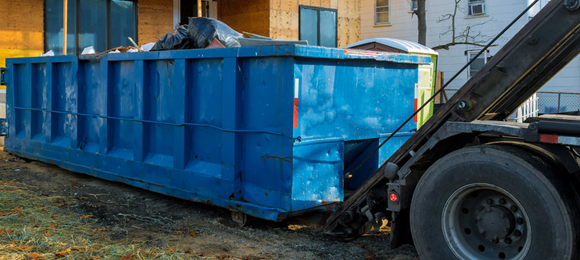
Updated March 1, 2023
The average time it takes for plastic to start decomposing in landfills is 700 years!
Knowing this, it's no wonder consumers and businesses are being called now more than ever to recycle plastic as often as possible.
We have a great opportunity to reduce the size of our landfills at a time when landfill "real estate" is limited and dwindling by the day.
Recycling is a great cause but there are rules you must follow in order to not contaminate a batch of recyclables.
Not following these rules can lead to recyclables having to be tossed into a landfill, producing the exact opposite results you were trying for.
We'll go over everything you need to know about plastic recycling for homes and businesses so you can ensure your recycling efforts don't go to waste.
Jump to:
- Benefits of Recycling Plastic
- How to Properly Recycle Plastic
- Things to Avoid When Plastic Plastic
- Where to Recycle Plastic
Find plastic recycling near you
Benefits of Recycling Plastic
As we've already mentioned, one of the more obvious benefits of recycling plastic is conserving landfill space, but that only just scratches the surface of the many benefits of plastic recycling.
Many of us were taught in school that recycling helps keep our environment healthy, but exactly how do our efforts impact the earth?
For every ton (2,000 lbs) of plastic that is recycled:
- 30 cubic yards of landfill space is conserved.
- 5.774 kWh of energy is conserved. (This is equivalent to the average amount of energy 2 people use over the course of a year!)
- 16.3 barrels of oil is conserved.
- 98 million BTU's of energy is conserved.
- C02, methane, and other greenhouse gas emission is reduced.
If you're more motivated by the economy than you are the environment, don't worry, we've got you covered there too.
A new study by Eco-Cycle shows that if the United States could transition to a 75% recycling rate by the year 2030, we would create an estimate 1-2 million new jobs!
Jobs created by the recycling industry aren't minimum wage jobs, either. The recycling industry offers theirs workers competitive wages and health benefits.
Learn more:
- How Recycling Facilities Work
- Recycling 101: Learn How to Recycle More and Throw Out Less
- Recycle Your Electronics With Junk Removal Services
How to Properly Recycle Plastic
One of the most important things to keep in mind when doing recycling of any kind is that it is crucial to keep all recycling products clean of any oil, grease, food, or beverage.
Not making sure to clean out plastic condiment containers or glass sauce jars can contaminate whole batches of recyclables, making your well-intentioned efforts cause more harm than good.
A shocking revelation to many well-intentioned recyclers is discovering that not all plastic can be recycled.
Always read the labeling on your recycling bin and do some independent research by reading your recyclers' website to discover exactly what types of plastic can and cannot be recycled at their facility.
The best practices for recycling any type of material is to understand exactly what can and can't go in your bin, specifically in your area.
Some recycling facilities can handle certain products that others cannot.
That's why it's important to get a list of accepted material directly from your waste management company so that you aren't mistakingly contaminating the plastic or other items you're trying to recycle.
Recyclable plastic is numbered to indicate what type of plastic it is.
Plastic with a recycling label of 1 or 2 is almost always accepted at any plastic recycling facility, plastic labeled as 3 almost never goes in your recycling, and plastic with a label of 6 is only accepted by some plastic recycling plants.
Compostable plastic should never go into your recycling bin with other non-biodegradable plastic and should be composted for the most environmentally-friendly disposal.
As the world becomes more eco-conscious, plastic grocery and shopping bags are starting to be labeled as recyclable, but it is very important to do research about your particular recycling facility and what materials they accept.
While many of these types of grocery bags are labeled as recyclable plastic no. 2, some recycling plants have the proper machinery to recycle these types of plastic bags or film while others can suffer serious repercussions if these types of plastic are put through their machinery.
Throwing plastic bags into your recycling bin that is being transported to a recycling plant that does not accept these items can do serious damage to the machinery it gets sent through, sometimes causing shut downs and delays for whole business days until the proper repairs can be made.
In these instances, you can typically return the recyclable plastic bags back to the establishment that gave them to you so that they can responsibly recycle them for you.
Here is a list of the different number classes that plastic falls into:
- PETE (Polyethylene Terephthalate): Plastic bottles, microwavable food trays, cosmetic bottles, mouthwash bottles, etc.
- HDPE (High-Density Polyethylene): Detergent bottles, grocery bags, milk jugs, shampoo/conditioner bottles, etc.
- PVC (Polyvinyl Chloride): Water pipes, siding, window frames, clothing, furniture, shower curtains, toys, etc.
- LDPE (Low-Density Polyethylene): 6-pack rings, cling wrap, bread bags, some shopping bags, plastic film, etc.
- PP (Polypropylene): Straws, toys, bottle caps, packaging tape, cereal liners, squeeze bottles (i.e. ketchup bottles), yogurt containers, etc.
- PS (Polystyrene): Styrofoam, disposable coffee cups, foam packaging, plastic cutlery, egg cartons, packing peanuts, etc.
- Polycarbonate, BPA, and Other Plastics: Baby bottles, water coolers, food containers, car parts, etc.
The most commonly recycled types of plastic are 1 and 2.
In some circumstances, some types of 4, 5, and 7 plastic can be recycled.
Very rarely, some types of 3 and 6 plastic can be recycled.
It can feel overwhelming when you first make the conscious effort to recycle, but it really is more straight-forward than it looks at first glance.
Get used to looking for the recycling symbol on different types of plastic and check for a number in the center of it.
After you've made sure you understand what types of materials are accepted at your recycling facility and once you get used to checking plastic for their number categories, it really does become second nature.
If you're lucky enough to live in an area that offers a free curbside recycling program, take advantage of the program to save space in your trash bin and save money on monthly household disposal costs!
Things to Avoid When Recycling Plastic
There are many common mistakes well-intentioned people make when recycling plastic.
One of the most common is tossing in plastic that isn't labeled as recyclable or contributing recyclable plastic that isn't accepted at your particular recycling facility.
It's also important to crush items like plastic water bottles when possible.
Doing so will help conserve space in transfer trucks and recycling bins.
Another common mistake people make is throwing in plastic containers that haven't been cleaned and rinsed of whatever product they were containing.
Plastic cutlery can be too lightweight to be picked up as plastic by recycling machines, placing them in a paper recycling section which can then contaminate and ruin entire batches of recycled paper.
That's why it is so important to make sure what your particular recycling center accepts, because not all recycling machines are made the same.
Check with your local recycling facility to learn more.
Where to Recycle Plastic

If your curbside trash service also offers recycling, having your recycling picked up at the end of your driveway is certainly the most convenient option.
Better yet, if you live in California, Connecticut, Hawaii, Iowa, Maine, Massachusetts, Michigan, New York, Oregon, or Vermont, you can return plastic soda bottles to the place you purchased them to get your bottle deposit back.
For those who live in areas where this isn't offered, however, there are plenty of other options available.
Many communities have drop-off recycling programs or community dumpsters at different drop-off locations for recyclables.
Visit Earth 911 to find recycling centers or programs near you. You can type in the specific type of material you'd like to recycle, as well as your zip code, and you'll be shown recycling solutions in your area.
If you're a business or contractor that has large amounts of plastic to recycle that won't fit in your curbside collection, consider renting a dumpster for your recycling efforts.
Or, if you have a lot of plastic to recycle but not enough to justify renting a dumpster, consider hiring a junk removal company to haul away your plastic waste for you.
A junk removal company will be able to recycle all your plastic products without you having to lift a finger, and will donate salvageable items on your behalf.
Hometown makes it easy to find junk removal services and dumpster rentals for all types of disposals across the U.S., including recycling!
Search your zip code, answer a few quick questions about your project needs, and get free quotes from qualified companies in your area.


